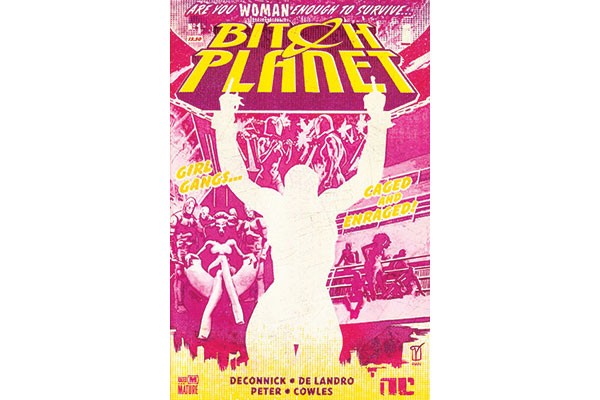This deeply feminist graphic novel is set in an alternate reality and somewhat dystopian future where non-compliant women are sent to an off-planet prison (AKA Bitch Planet). The comic follows a diverse group of women from different backgrounds. All of these women are watched and controlled by creepy observers who remain behind the scenes. A group of the women are coaxed into taking part in a televised and political blood-sport for the entertainment of the (mostly male) population back on earth.
As in the real world, the majority of the women in the prison are women of colour. The prisoners’ offences range from murder, to violence, to non-compliance of societal standards and expectations. A character that really stuck with me is an extremely large black woman by the name of Penny Rolle. One major aspect of her imprisonment is to do with her ‘wanton obesity’. She’s hooked up to a machine by a panel of men, who explain that they only wish to help her find her true self, her ideal self. The machine reads her mind to find an image of how she wishes to appear, and what is revealed may as well be a reflection of her physical appearance. The objections and cries of “what is wrong with you?!” from the men are drowned out only by her laughter. DeConnick depicted something I’ve never seen executed well in most forms of media —a fat woman who loves herself as she is.
Bitch Planet is definitely a feminist read, and is steeped in a feminist perspective which is, for me, refreshing. When most comics focus on the sexy part of women and lack in the character aspects, it’s exciting to see something that is about women, and isn’t afraid to leave the sexy out. What’s more, there’s a few pages at the back of the comic discussing intersectional feminism, designed specifically to encourage discussion and learning.
My only real criticism of Bitch Planet would be how quickly you’re dropped into this world. There’s no slow introduction and no time wasted on exposition, and considering the topics they’re covering it’s understandable—there wouldn’t be room. However, it means when you’re initially entering into the world of Bitch Planet, it can be hard to find your footing.
In saying that, I loved the read and easily found a way to engage and understand the material. I would definitely recommend this to anyone interested in feminist writing, or someone who likes comics, but gets frustrated with the often sexualised nature of the things.







